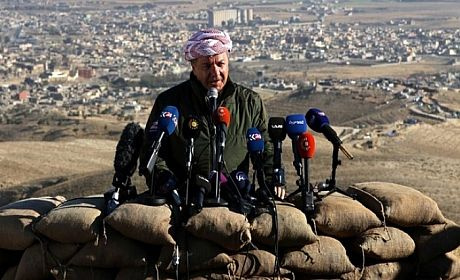Middle East’s New Challenge with Iraqi Kurdistan

With a complex network of crises and conflicts, the Middle East is constantly concerned about unrests one after another. Already, the Arab Spring developments since 2011, consequent religious conflicts, the emergence of ISIS with terrorist operations and suicide bombings have created waves of chaos across the region. The fall of ISIS in Iraq and Syria does not seem to be the end of turmoil, as a new season is on the way.
On September 25, Kurdistan region of Iraq will run a referendum of independence from the country’s central government. Observers see the prospect of intraregional violence and conflict as well as extra-regional interventions to follow.
The Sykes–Picot Agreement that divided the Ottoman Empire not only became a platform to establish new political units but also managed to separate certain nations by imposed borders. Ever since then, these separated nations have sought their ancestral territory and a state associated with the territory. The Kurds provide one example as an ethnic community without a land, dispersed in Iraq, Turkey, Syria, and Iran. The Iraqi Kurds in the Kurdistan Region of Iraq, with a parliament and an army called Peshmerga, have seized the opportunity in the unstable Iraq, which is busy fighting ISIS, to call for independence.
Optimistically, the referendum could find the Kurds, who have long wanted to establish their identity based on the nation/state concept, an independent homeland, separating them from the Arabs, which is supposed to help them overcome the historical sense of injustice in their hearts.
Other speculations apply for the main land and the central government of Iraq. The independence could alleviate sectarian violence caused by cultural differences and ethnic demands and remove geopolitical threats of having a minority inside the country. Seen from such perspectives, the sum of interests could result in regional stability.
On the other hand, the President of the Iraqi Kurdistan Masoud Barzani sees the postponement of the independence as a cause for Iraq’s instability. Many believe it will not be easy, saying it would undermine stability in the region, with regional and extraregional players looking at the situation from the lens of their own national interests.
Still suffering damages incurred by the fight against ISIS, the Iraqi government does not find it an appropriate time for Kurdistan’s independence, seeing it as a prelude to the potential collapse of Iraq. The main challenge for Iraq is to lose a large portion of its territory which is tantamount to weaker national power. Also, it is difficult for the central government to ignore the oil reserves in Kurdistan. If Baghdad wants to use force against the Kurds over their independence, its international image will suffer. Violence against the Kurds will not only spark international fury, but also lead to the termination of financial aid from Washington.
Turkey, too, considers the independence a grave mistake. The Kurdish minority’s background inside Turkey and on its borders with Syria has always been a geopolitical threat for Ankara. From an economic point of view, with a trade balance worth $10b and use of the Ceyhan port as the main exports channel for Kurdistan oil with 1 million bpd, Turkey’s disapproval means financial pressure for Kurdistan. It should be noted that Kurdistan is landlocked and must rely on neighbors, which have access to free waters.
Despite its policy of non-intervention in the internal affairs of other nations, Iran, which has a Kurdish minority, considers Kurdistan’s independence a potential threat that could lead to a regional crisis. Of course, the Kurds could find allies too: supporters like the US and Russia, who have never abandoned the Middle East because of their national interests.
The sensitive situation in Kurdistan is a controller for the US, used vis-a-vis Iraq, Turkey, and Syria. Since the Kurds’ historical claims have always been suppressed, they have no interest in determination of their destiny by regional powers. They have been Trump’s best ally in the fight against ISIS. Therefore, a timely independence seems to be a good reward for the US’ most faithful friends. Note that the Iraqi Kurdistan is a valuable ally for the US but will be a relatively poor country, heavily depending on oil when independent. In contrast, Iraq is more developed and experienced as an independent state. Furthermore, to the US, agreement with Kurdish independence could mean cold ties with Turkey, a strong economy, NATO member, and military ally in Iraq.
Russians see the Kurds as key players in the future of the Middle East. If separated from the central government of Iraq, Kurdistan would be a good partner for oil deals and Russia could discover oil in the land close to their borders, enriching their strategic status.
On the other hand, Russia can count on the Kurds against regional power and its rival, the United States, to turn threats of the Middle East into new opportunities. Some analysts and Russian diplomats believe the Kurds could use the victory over ISIS, due to the number of forces the used on the battleground, to legitimize their claim and Moscow should be ready for what the Kurds see as a historical opportunity. However, conservative observers find the independence the onset of the region’s disintegration, which could spread to the countries with Kurd minorities and weaken Russia’s ties with the suffering countries.
For its independence and accomplishment of notions such as the right of self-determination, national sovereignty, territorial integrity, and nation/state, the Iraqi Kurdistan awaits the referendum, having faith in international peace that never ignores the wishes of nations. The Middle East will also have challenging days ahead.

